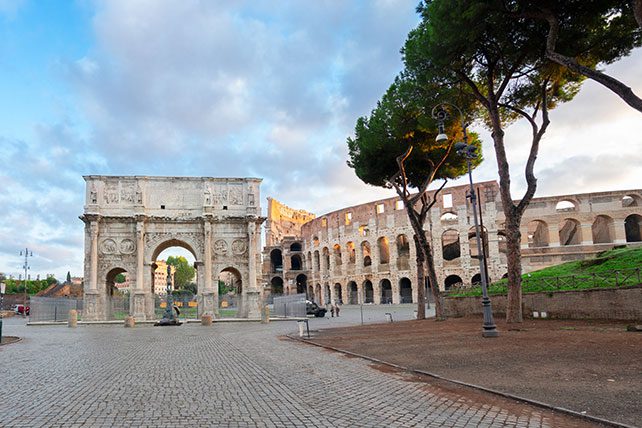The Roman Empire, a colossal entity in human history, played a pivotal role in the spread and shaping of Christianity, one of the world’s major religions. This ancient civilization, known for its remarkable achievements in law, architecture, and governance, also became the cradle for the growth of Christianity from a minor Jewish sect to a dominant global religion. The journey of Christianity within the Roman Empire is a story of paradoxes: from persecution and martyrdom to triumph and establishment.
The Early Days of Christianity in the Roman Empire
The early Christian community in Rome emerged from a backdrop of diverse religious beliefs and practices. Despite the empire’s renowned tolerance for various cults and deities, Christians faced suspicion and hostility. Their refusal to worship Roman gods and the emperor, seen as an act of treason, positioned them as outcasts and rebels in a society that valued religious conformity for the sake of public order.
RELATED: When God’s People Do Not Live in the Word, Bad Things Happen
During these formative years, the social and political conditions for Christians in Rome were fraught with challenges. Official recognition was non-existent, and adherence to the Christian faith often meant a clandestine existence. The catacombs, now famous underground burial places, served as secret meeting spots for worship and fellowship, away from the prying eyes of Roman authorities. These hidden networks not only facilitated the practice of their faith but also fostered a strong sense of community and solidarity among early believers.
Persecution and Martyrdom
The narrative of early Christianity is marked by periods of intense persecution under various Roman emperors. Nero, for instance, infamously blamed Christians for the great fire of Rome in 64 AD, leading to brutal executions and widespread condemnation. However, it was not solely the actions of tyrannical leaders that fueled persecution; the general mistrust and misunderstanding of Christian practices contributed to their plight.
Martyrdom became a defining element of early Christian identity. Figures such as Peter and Paul, along with countless others, became symbols of faith and perseverance through their willingness to face death rather than renounce their beliefs (2 Timothy 3:12). This era of bloodshed paradoxically strengthened the resolve of Christian communities and deepened their commitment to their faith. The legacy of martyrdom became a cornerstone of Christian tradition, embodying the ultimate expression of devotion and sacrifice.
Constantine the Great and the Edict of Milan
The turning point for Christianity within the Roman Empire came with the reign of Emperor Constantine the Great. His conversion to Christianity, whether driven by genuine faith or political strategy, marked the beginning of a new era. The most significant event during his rule was the issuance of the Edict of Milan in 313 AD, which proclaimed religious tolerance throughout the empire. This edict effectively ended the state-sponsored persecution of Christians and granted them the freedom to practice their religion openly.
The impact of Constantine’s conversion and the Edict of Milan on Christianity was profound. Christians were not only permitted to worship freely but also began to receive patronage from the emperor himself, leading to the construction of churches and the establishment of Christianity as a legitimate and significant presence in Roman society. The transformation under Constantine paved the way for the religion’s growth in numbers, influence, and institutional structure within the empire.
Christianity’s Influence on Roman Society and Culture
As Christianity gained footing and favor in the Roman Empire, it began to exert significant influence on various aspects of Roman life. The shift from paganism to Christianity was gradual but transformative, altering everything from daily rituals to governing principles. Christian ethics, emphasizing virtues like humility, charity, and forgiveness, started to permeate Roman laws and social policies, marking a departure from the previous norms.
The ascendance of Christian thought also reshaped the Roman intellectual landscape. Christian leaders and theologians, such as Augustine of Hippo, contributed to philosophical discussions, infusing them with theological insights and Christian doctrine. The impact of these changes was far-reaching, affecting art, education, and public morality. The transition from a polytheistic society to one increasingly dominated by Christian monotheism reflected a profound cultural and spiritual reorientation.

